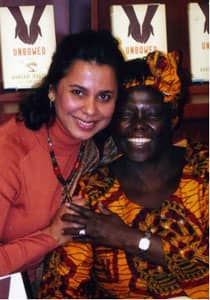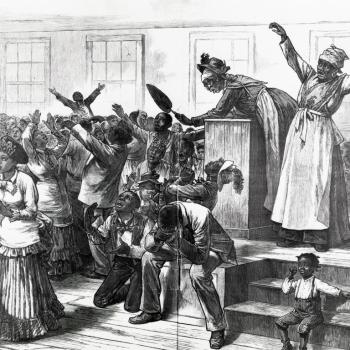 Nobel Laureate Wangari Maathai was an extraordinary woman. As the world mourns an indefatigable champion of human rights, democracy, and the environment, I am heartbroken at the loss of the woman I most admired, the woman from whom I learned some of life's most valuable lessons.
Nobel Laureate Wangari Maathai was an extraordinary woman. As the world mourns an indefatigable champion of human rights, democracy, and the environment, I am heartbroken at the loss of the woman I most admired, the woman from whom I learned some of life's most valuable lessons.
Lesson One: Progress Comes with Shared Values
I met Wangari almost twenty years ago. She was then a member of the Commission on Global Governance, a group of twenty-eight world leaders tasked with finding solutions for the global community to better manage its affairs. I was the Commission's press and information officer. As members deliberated weighty ideas, Wangari always grounded the discussion on the fundamental need for shared values. She knew that progress on any front, whether security or development or governance, could only happen if we shared a commitment to core values—justice, equity, integrity, and mutual respect. Progress could only be made if we cared for each other like neighbors and cared for our global neighborhood.
Over the years, I had the privilege of hearing Wangari speak around the world at conferences and press events, townhalls and townships. I was always mesmerized by her eloquence. She captivated every audience with her warmth, charm, grace, and humor; within a few minutes you felt you had a new best friend. I miss her melodious voice. The way she repeated "very, very" for extra emphasis, her infectious laugh and that smile.
Lesson Two: A Movement Starts with One
When I visited Wangari in Nairobi, I had the chance to meet some of the women behind her movement. We went to the site where she had started the first tree nursery. A sign for the Green Belt Movement marked the spot. The area, previously barren, was thick with trees—strong, deeply rooted, unbowed, like the woman who inspired their planting. At the Murang'a tree nursery, more than a hundred women had gathered that day, dressed in colorful traditional kangas, singing welcome songs in Swahili.
Proudly, they showed me how to plant a tree, highlighting each step of the process from finding the seeds, to making the beds, to making sure it grows. These are Wangari's warriors, now 900,000 strong. They are infused with her dignity, her sense of action. They will continue her fight and sustain her passion. I planted a tree that day, a Meru oak. The women promised to water it until I returned.
Lesson Three: Nothing Is Impossible
One of my life's most cherished experiences will always be being with Wangari at the non-governmental forum for the 1995 United Nations Fourth World Conference on Women in Huairou, China. Walking beside her was like being with a rock star. Women engulfed her wherever we went. They wanted to be near her and imbibe her contagious energy. She would stop and talk to each one, listen to their stories, and embrace them with her all-encompassing hug.
Her stamina was incredible. Each day we would walk what seemed like miles in the rain, wading through ankle-deep puddles with armloads of pamphlets and boxes of materials from one meeting site to the next. She was undeterred. Once she asked if I could arrange one more event at the last minute. Foolishly, I said that it would be difficult. I will never forget her expression. That day I learned the lesson that has no doubt guided her journey: Nothing is impossible.
Lesson Four: Be a Hummingbird
After she won the Nobel Peace Prize in 2004, Wangari often came to Washington, D.C. with her daughter Wanjira. I would see her during these visits and bring my children to meet her. I had told them all about my heroine—of how as a young girl she would drink water from a stream and play among the arrowroot leaves, and why that stream now runs dry; how she didn't have shoes to go to school early on, but when she did get the chance to learn, she seized every opportunity; how one day she had an idea to plant some trees to nurture the earth, and how those trees multiplied to 40 million.
My kids shared with her their favorite book, fittingly, The Giving Tree. She shared with them her favorite story about the hummingbird: When a fire breaks out in a huge forest, all the animals flee except the hummingbird. The little bird flies back and forth, its tiny beak filled with water. The other animals are petrified. When they ask what the hummingbird can possibly do with its small beak, the little bird answers, "I am doing the best I can."
Dear Wangari, thank you for inspiring me to believe that each one of us can do something—the best we can—to make the world a better place; for showing me what it means to live with dignity, to work with conviction, and to never give up, no matter the odds; for teaching me that we can live gently but be fiercely committed to what is just; and, for sharing with me just how warm a hug can feel and how wide a smile can stretch.
9/30/2011 4:00:00 AM




